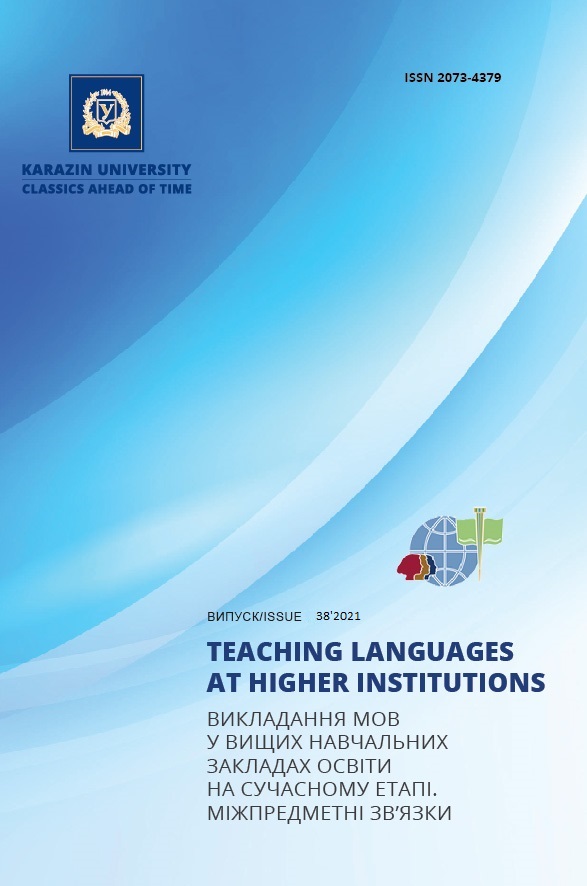Mastering of Ukrainian collocations by foreign students
Abstract
The article deals with the problems of teaching Ukrainian collocations to those foreign students who speak Russian as a first foreign language. Acquisition of skills needed to be able to combine the proper words entails great difficulties at all stages of teaching Ukrainian as a foreign language. One of the conditions for overcoming these difficulties is the development of a system of work, which would allow foreign students to master the combinatory power of Ukrainian words as a component of the formation of mechanisms for designing sentences and coherent statements. The author presents methodical recommendations on teaching specifics of combining words in the Ukrainian language to foreigners. The article contains a description of typical errors in word combinations, which occur in the oral speech of foreign students. Hence, there is a need to identify ways to prevent and overcome manifestations of lexical interference: development of a complex of educational and training exercises; organization of an effective system for monitoring acquisition of training material. Accounting for lexical interference when studying Ukrainian as a foreign language allows foreseeing possible errors in the oral speech of Russian-speaking foreign students and reducing the number of such errors, that could facilitate the learning process and, therefore intensify it. The author recommends practicing skills of translating collocations from Russian into Ukrainian in the form of individual tasks. Developing phrase constructing skills in students, one should move from the function to form, from the value to the means of its expression, based on such universal concepts of logic and semantics, as an action, attitude, subject, object, addressee, tool, etc. In the process of mastering Ukrainian, the study of the laws governing the combinatory power of words in the context, understanding the features of a word functioning and its interaction with other words in the language system play an important role. The absence of such knowledge and language intuition causes numerous speech errors, which significantly reduce the level and quality of communicative-speech skills.
Downloads
References
Balko, M.V. (2004). Semantyko-syntaksychni i strukturni aspekty tsilisnykh slovospoluchen suchasnoi ukrainskoi movy [Semantic-syntactic and structural aspects of integral phrases of the modern Ukrainian language]. Extended abstract of candidate’s thesis. Zaporizhzhia: Donetskyi natsionalnyi universytet im. V. Stusa [in Ukrainian].
Kocherhan, M.P. (1980). Slovo i kontekst: Leksychna spoluchuvanist i znachennia slova [Word and context: Lexical compatibility and meaning of the word]. Lviv: Vyshcha shkola [in Ukrainian].
Morkovkin, V.V. (1990). Osnovy teorii uchebnoj leksikografii [Fundamentals of the theory of educational lexicography]. Extended abstract of doctor’s thesis. Moskva: Institut jazykoznanija RAN [in Russian].
Semenova, T.I. (1992). Obuchenie inojazychnih studentov-filologov leksiko-sintaksicheskoj sochetaemosti slov russkogo jazyka (na materiale glagolno-imennyh slovosochetanij s objektnymi otnoshenijami [Teaching foreign language students-philologists the lexico-syntactic collocation of words of the Russian language (on the material of verbal-nominal phrases with object relations)]. Extended abstract of candidate’s thesis. Nizhnij Novgorod [in Russian].
Trostynska, O.M. (2015). Porivnialnyi metod u navchanni hramatyky ukrainskoi movy rosiiskomovnykh inozemtsiv [Comparative method in teaching Ukrainian grammar to Russian-speaking foreigners]. Vykladannia mov u vyshchykh navchalnykh zakladakh osvity na suchasnomu etapi. Mizhpredmetni zviazky [Teaching Languages at Higher Institutions]. Kharkiv: V.N. Karazin Kharkiv National University, 27, pp. 108−117 [in Ukrainian].

